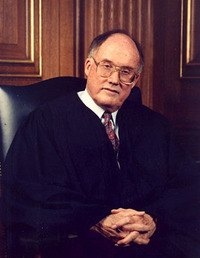
William Rehnquist
Actor
Milwaukee, Wisconsin, USA
William Hubbs Rehnquist (ˈrɛnkwɪst; October 1, 1924 – September 3, 2005) was an American lawyer and jurist who served on the Supreme Court of the United States for 33 years, first as an Associate Justice from 1972 to 1986, and then as the 16th Chief Justice of the United States from 1986 until his death in 2005. Considered a conservative, Rehnquist favored a conception of federalism that emphasized the Tenth Amendment's reservation of powers to the states. Under this view of federalism, the court, for the first time since the 1930s, struck down an act of Congress as exceeding its power under the Commerce Clause. Born in Shorewood, Wisconsin, Rehnquist pursued a legal career in Phoenix, Arizona after graduating from Stanford Law School. He clerked for Associate Justice Robert H. Jackson during the Supreme Court's 1952–1953 term and served as a legal adviser for Republican presidential nominee Barry Goldwater in the 1964 election. In 1969, President Richard Nixon appointed Rehnquist as Assistant Attorney General of the Office of Legal Counsel. In 1971, Nixon nominated Rehnquist to succeed Associate Justice John Marshall Harlan II, and Rehnquist won Senate confirmation that same year. Rehnquist quickly established himself as the most conservative member of the Burger Court. In 1986, President Ronald Reagan nominated Rehnquist to succeed retiring Chief Justice Warren Burger, and Rehnquist again won Senate confirmation. Rehnquist served as Chief Justice for nearly 19 years, making him the fourth-longest-serving Chief Justice, and the eighth-longest-serving Justice. He became an intellectual and social leader of the Rehnquist Court, earning respect even from the Justices who frequently opposed his opinions. Though he remained a member of the conservative wing of the court, Associate Justices Antonin Scalia and Clarence Thomas were often regarded as more conservative. As Chief Justice, Rehnquist presided over the impeachment trial of President Bill Clinton. Rehnquist wrote the majority opinions in United States v. Lopez (1995) and United States v. Morrison (2000), holding in both cases that Congress had exceeded its power under the Commerce Clause. He opposed the court's Roe v. Wade (1973) decision and continued to argue that Roe had been incorrectly decided in Planned Parenthood v. Casey (1992). In Bush v. Gore (2000), he voted with the court's majority to end the Florida recount.
William Hubbs Rehnquist (ˈrɛnkwɪst; October 1, 1924 – September 3, 2005) was an American lawyer and jurist who served on the Supreme Court of the United States for 33 years, first as an Associate Justice from 1972 to 1986, and then as the 16th Chief Justice of the United States from 1986 until his death in 2005. Considered a conservative, Rehnquist favored a conception of federalism that emphasized the Tenth Amendment's reservation of powers to the states. Under this view of federalism, the court, for the first time since the 1930s, struck down an act of Congress as exceeding its power under the Commerce Clause.
Born in Shorewood, Wisconsin, Rehnquist pursued a legal career in Phoenix, Arizona after graduating from Stanford Law School. He clerked for Associate Justice Robert H. Jackson during the Supreme Court's 1952–1953 term and served as a legal adviser for Republican presidential nominee Barry Goldwater in the 1964 election. In 1969, President Richard Nixon appointed Rehnquist as Assistant Attorney General of the Office of Legal Counsel. In 1971, Nixon nominated Rehnquist to succeed Associate Justice John Marshall Harlan II, and Rehnquist won Senate confirmation that same year. Rehnquist quickly established himself as the most conservative member of the Burger Court. In 1986, President Ronald Reagan nominated Rehnquist to succeed retiring Chief Justice Warren Burger, and Rehnquist again won Senate confirmation.
Rehnquist served as Chief Justice for nearly 19 years, making him the fourth-longest-serving Chief Justice, and the eighth-longest-serving Justice. He became an intellectual and social leader of the Rehnquist Court, earning respect even from the Justices who frequently opposed his opinions. Though he remained a member of the conservative wing of the court, Associate Justices Antonin Scalia and Clarence Thomas were often regarded as more conservative. As Chief Justice, Rehnquist presided over the impeachment trial of President Bill Clinton.
Rehnquist wrote the majority opinions in United States v. Lopez (1995) and United States v. Morrison (2000), holding in both cases that Congress had exceeded its power under the Commerce Clause. He opposed the court's Roe v. Wade (1973) decision and continued to argue that Roe had been incorrectly decided in Planned Parenthood v. Casey (1992). In Bush v. Gore (2000), he voted with the court's majority to end the Florida recount.
William Rehnquist Movies & TV Shows - Watch Online


